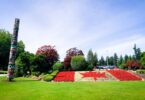Are you considering moving to Nova Scotia and want to understand the education system?
Or perhaps you’re a parent who wants to make informed decisions about your child’s education in this province.
Look no further, as we have put together a comprehensive guide to help you navigate the education system in Nova Scotia.


Education is a vital aspect of any community, and Nova Scotia is no exception. As with any region, understanding the intricacies of the education system can be overwhelming, especially if you are new to the area.
Whether you are interested in the public school system, private schools, or homeschooling options, it is essential to have a clear understanding of what Nova Scotia has to offer.
In this comprehensive guide, we will explore the various components of the education system in Nova Scotia, including the structure of the school system, curriculum options, available resources, and extracurricular activities.
By the end of this guide, you will have a solid foundation of knowledge to make informed decisions about education in Nova Scotia. So, let us dive in and explore the education system in this beautiful province.
Overview of Education System in Nova Scotia
The education system in Nova Scotia is a comprehensive and inclusive system that aims to provide quality education to all students. The province follows a publicly funded education system, with a mix of public and private schools.
Public schools, under the administration of regional centres for education, offer education from elementary to secondary levels. Private schools, on the other hand, provide alternative educational options with a variety of programs and teaching methods.
The provincial government, specifically the Department of Education and Early Childhood Development, oversees the education system and ensures that every child in Nova Scotia has access to education irrespective of their background or abilities.
The education system in Nova Scotia is recognized for its commitment to inclusive education and its dedication to fostering positive relationships between teachers and students. It also emphasizes the importance of child-centered learning and provides support for students with diverse needs.
With its focus on academic excellence and well-rounded development, the education system in Nova Scotia strives to equip students with the skills and knowledge needed for success in their future endeavors.
Structure of Education System in Nova Scotia
The education system in Nova Scotia follows a structured framework that encompasses various levels of education. At the foundational level, children attend elementary school, which typically covers grades primary to six.
Here, students receive a well-rounded education that focuses on fundamental subjects and skill development.
After elementary school, students move on to junior high school, which usually spans grades seven to nine.
Junior high school serves as a transition phase between elementary and high school, preparing students for more advanced studies and providing a wider range of subjects.
Finally, high school education in Nova Scotia encompasses grades ten to twelve. During this phase, students have the opportunity to choose from a variety of academic and vocational courses to suit their interests and career aspirations.
High school graduation leads to earning a secondary school diploma, which establishes a foundation for further education and employment opportunities.
Post-secondary education options in Nova Scotia include universities, colleges, and trade schools. These institutions offer diverse programs for students seeking higher education and specialized training in various fields.
Students have the opportunity to pursue bachelor’s degrees, diplomas, certificates, or apprenticeships to develop their skills and knowledge further.
The education system in Nova Scotia strives to provide students with a solid foundation and a range of options for personal and professional growth beyond high school.
Public Schools
Public Schools in Nova Scotia
Public schools in Nova Scotia are a crucial component of the education system, overseen by the provincial government, and are instrumental in providing cost-free learning opportunities to students from diverse backgrounds.
A key focus of these schools is inclusivity, striving to create a supportive and nurturing environment for students’ growth and learning. The curriculum, provided by the Department of Education, ensures a comprehensive and well-rounded education for all students.
Moreover, public schools in Nova Scotia offer diverse programs and extracurricular activities tailored to meet the unique needs and interests of students. With dedicated teachers and staff, these schools are instrumental in preparing students with the necessary knowledge, skills, and values for future success.
What is a Public School?
A public school in the context of the education system in Nova Scotia refers to a school that is operated and funded by the provincial government. These schools operate under the guidance of the Minister of Education, ensuring adherence to the government’s educational policies and standards.
Public schools in Nova Scotia are open to all students, regardless of their background or socioeconomic status. They provide free education to children and young individuals, aiming to ensure equal access to quality education for all.
Public schools in Nova Scotia typically offer education from primary to secondary levels, accommodating students of various age groups. These schools play a vital role in shaping the future of Nova Scotia’s youth by providing inclusive and comprehensive learning experiences.
Operating on public funding, public schools in Nova Scotia rely on government allocations and resources to function effectively. This funding allows them to provide a wide range of programs and services, ensuring a holistic education for their students.
Public schools are held accountable for their teaching methods, curriculum design, and adherence to educational regulations set by the Minister of Education.
The publicly funded nature of these schools ensures that education is accessible to all residents of Nova Scotia, contributing to the province’s commitment to providing quality education to its citizens.
History and Development of Public Schools in Nova Scotia
The evolution of public schools in Nova Scotia has been a captivating process that has greatly influenced the province’s education system. Nova Scotia’s public school history dates back to the 18th century when the first English-speaking schools in Canada were founded in Halifax.
Initially, these schools were predominantly managed by religious groups and focused on educating children from affluent backgrounds.
The history and growth of public schools in Nova Scotia have been captivating and have had a profound impact on the province’s education system. One such milestone was the establishment of catchment schools in the early 20th century, which aimed to bring education within reach of every child in the province.
Another significant event was the creation of district school boards in the 1990s, which decentralized control of public schools and allowed for more localized decision-making.
Today, public schools in Nova Scotia are diverse and inclusive, offering a variety of programs to meet the needs and interests of students. The education system places a strong emphasis on student-centered teaching methods and the holistic development of each child.
The provincial government, through the Department of Education and its regional centers for education, plays a crucial role in ensuring access to education and improving educational outcomes for all students in Nova Scotia.
Governance and Funding of Public Schools in Nova Scotia
In Nova Scotia, the administration of public schools is primarily under the jurisdiction of the provincial government. The Department of Education and Early Childhood Development assumes a pivotal role in formulating policies, defining standards, and implementing regulations to uphold a high-quality education system.
Their responsibilities include developing curriculum frameworks, establishing educational goals, and monitoring school performance. The government’s main objective is to provide an inclusive education that meets the diverse needs of students across the province.
In terms of funding, public schools in Nova Scotia rely primarily on funding from the provincial government. The government allocates funds to school boards based on factors such as student enrollment, needs, and regional demographics.
This funding covers various aspects of education, including staff salaries, resources, infrastructure, and special education programs. Additionally, the provincial government has committed to increasing funding for public education to address ongoing challenges and ensure students have access to quality education.
By maintaining a strong governance structure and adequate funding, Nova Scotia’s public schools strive to provide an enriching learning experience for all students.
Variety of Programs Available in Public Schools
In Nova Scotia, public schools offer a wide range of programs aimed at enriching students’ educational experiences and fostering their personal development. These programs encompass various academic subjects, including mathematics, science, social studies, and language arts, providing students with a comprehensive foundation of knowledge.
Additionally, public schools in Nova Scotia offer a plethora of extracurricular activities such as sports, arts, music, and clubs, giving students the opportunity to explore their interests and talents outside the traditional classroom setting. Moreover, public schools prioritize the implementation of support programs to ensure that students receive the assistance they need to thrive academically and emotionally.
These support programs include counseling services, specialized support for students with disabilities, and resources for students struggling with specific subjects. Overall, the variety of programs available in public schools in Nova Scotia plays a vital role in enhancing students’ learning experiences and promoting their personal development.
These programs have a significant impact on students’ educational journeys by offering a holistic approach to learning. By providing a diverse range of academic programs, public schools allow students to explore different subject areas and discover their passions.
This not only engages students in their education but also helps them develop a well-rounded knowledge base. Additionally, extracurricular activities offered by public schools provide students with opportunities to develop valuable skills such as teamwork, leadership, and creativity, enhancing their personal growth and social development.
Furthermore, support programs play a crucial role in ensuring that students receive the necessary resources and assistance to overcome challenges and succeed academically.
By addressing the individual needs of students, these programs create a supportive and inclusive learning environment. Overall, the variety of programs available in public schools in Nova Scotia contributes to the overall enhancement of students’ learning experiences and personal development.

best health insurance in Canada

Cultural Exchange Programs in Vancouver: A Comprehensive Guide
Access to Education for All Students in Grades K-12
Access to education is a fundamental right for all students in grades K-12 in Nova Scotia. Every person between the ages of five and 21 is guaranteed the opportunity to attend a public school, ensuring equal access to education for all.
In addition to public schools, there are also options available for students to attend private schools or receive home education. This allows families to choose the educational path that best suits their child’s needs.
Nova Scotia is dedicated to providing inclusive education supports to students, ensuring that every student has the opportunity to thrive academically, regardless of their individual needs.
Inclusive education programs aim to create inclusive environments where students of all abilities can learn together. This includes providing appropriate resources, accommodations, and support services to meet the diverse needs of students, including those with disabilities or special educational needs.
By embracing inclusive education practices, Nova Scotia is committed to ensuring that every student has an equal opportunity to succeed and reach their full potential.
Inclusive Education Model at Public Schools in Nova Scotia
Nova Scotia’s public schools are committed to implementing an inclusive education model that ensures the success of all students, regardless of their diverse needs. This model provides various supports and accommodations to create an inclusive learning environment.
Teachers and staff are dedicated to understanding and meeting the individual needs of each student, including those with disabilities, learning differences, and cultural backgrounds.
Inclusive education is of paramount importance as it benefits students with diverse needs in numerous ways. By fostering an inclusive environment, students feel a sense of belonging and acceptance, promoting their overall well-being and self-confidence.
Inclusive education also encourages collaboration among students, enhancing their social and emotional development. Moreover, it creates a learning environment where all students can reach their full potential academically, as their unique strengths and learning styles are recognized and supported.
To promote inclusivity, several programs and initiatives are in place in Nova Scotia’s public schools, such as individualized education plans (IEPs), community partnerships, and professional development for educators to improve their understanding and teaching methods for diverse learners.
This ensures that every student has equal access to education, regardless of their unique needs, fostering an inclusive and supportive environment for all.
Private Schools
Nova Scotia boasts a diverse and inclusive education system that offers a variety of options for students, including private schools. Private schools in Nova Scotia provide alternative educational pathways for families seeking unique and specialized learning environments for their children.
These schools are independent from the public school system and are typically funded through tuition fees, fundraising efforts, and private donations. Private schools in Nova Scotia offer smaller class sizes, personalized attention, and a range of educational programs tailored to cater to individual student needs.
While private schools are not as widespread as public schools in the province, they offer an excellent option for families who desire a different approach to education.


What is a Private School?
A private school in Nova Scotia is defined under the Education Act 2018 as an educational institution that is privately owned and operated. These schools have the autonomy to design their own curriculum and teaching methods, granting them flexibility in providing education to their students.
Private schools do not receive funding from the provincial government and therefore rely on tuition fees paid by parents or guardians, as well as private donations and endowments, to sustain their operations.
In Nova Scotia, there are also Designated Special Education Private Schools (DESPS) that cater specifically to students with special educational needs. These schools offer tailored programs and resources to support students with diverse learning abilities.
The Tuition Support Program provides financial assistance to eligible families who choose to enroll their child in a DESPS. This program helps to alleviate the financial burden associated with private education for students requiring specialized educational support.
Through the DESPS and the Tuition Support Program, Nova Scotia acknowledges the importance of inclusive education and strives to provide options for students with unique learning requirements.
History and Development of Private Schools in Nova Scotia
Private schools in Nova Scotia have a long and rich history, dating back to the early days of the province’s settlement. These educational institutions have played a significant role in offering alternative educational experiences to students and families.
The evolution of private schools in Nova Scotia has been marked by their growth in numbers, diversity, and their ability to provide specialized education to meet the unique needs and interests of students.
From religious schools to independent academies, private schools have become an integral part of Nova Scotia’s education system.
Several factors have contributed to the growth and popularity of private schools in Nova Scotia. One key factor is the desire for parents to have more control and choice over their child’s education. Private schools offer a variety of programs and teaching methods that cater to different learning styles, allowing parents to find an educational environment that best suits their child’s needs.
Additionally, private schools are often known for their smaller class sizes, which can result in more individualized attention and support for students. The high academic standards and dedicated faculty also attract families who seek a rigorous and nurturing educational experience for their children.
As a result, private schools have become an appealing option for many families in Nova Scotia.
Governance and Funding of Private Schools in Nova Scotia
Private schools in Nova Scotia are governed by a set of regulations and policies that ensure quality education and the well-being of students. Under the Education Act 2018, c.1, sections 85-87, private schools are required to follow certain guidelines to operate legally.
These guidelines outline the standards for curriculum, teaching methods, facilities, and student support services. Private schools are also expected to maintain transparent governance structures and undergo regular inspections to ensure compliance with these regulations.
Private schools in Nova Scotia receive funding from various sources. While they do not receive public funding, they rely on student tuition fees to cover operating costs. In some cases, private schools may also receive grants or donations from individuals, corporate sponsors, or alumni.
This funding allows private schools to offer a variety of programs, extracurricular activities, and specialized resources to enhance the educational experience of their students.
This combination of regulation and funding ensures that private schools in Nova Scotia can provide high-quality education within a supportive and enriching environment.
Variety of Programs Available at Private Schools
Private schools in Nova Scotia offer a wide variety of programs to cater to the diverse needs and interests of students. These schools provide a unique curriculum that often goes beyond the standard provincial curriculum followed in public schools.
Private schools may offer specialized learning approaches such as Montessori, Waldorf, or International Baccalaureate programs, which provide a more holistic and hands-on learning experience. Additionally, private schools with religious affiliations may incorporate faith-based programs into their curriculum, allowing students to develop their spiritual beliefs alongside their academic journey.
These programs provide an enriching and well-rounded education that focuses on individual student development, instilling values, and nurturing talents.
One key difference between private schools and public schools in Nova Scotia is the range of program options available. While public schools generally follow a standardized provincial curriculum, private schools have the flexibility to design their own curriculum and offer specialized programs that align with their educational philosophies.
This allows for a more personalized approach to learning, catering to the unique strengths and interests of each student. Public schools, on the other hand, may have a more structured curriculum that aims to meet the educational needs of a larger, more diverse student population.
Private schools can provide an alternative educational experience, offering programs that emphasize particular subjects, teaching methods, or religious teachings that may not be available in public schools.

In-Demand Skills in Canada: A Comprehensive Guide

Ultimate Guide to Canada Retiree Visa: Application Process, Requirements, and Benefits
Access to Education for All Students at Different Levels (K-12)
In Nova Scotia, access to education is provided for all students at different levels, ranging from Kindergarten to Grade 12. The age cutoffs for entering these levels are as follows: children must be five years old by December 31st of the school year to enter Kindergarten, and they must be six years old by December 31st to enter Grade 1.
Grade progression follows a standard pattern, with students advancing one grade level each year until they complete Grade 12. This structured progression ensures that students receive a comprehensive education that prepares them for future academic endeavors.
Attending a public school in Nova Scotia is based on the principle of inclusivity, as every person over the age of five and under the age of 21 has the right to attend.
Regardless of their background or socioeconomic status, students are guaranteed the opportunity to receive a quality education within the public school system.
This commitment to accessibility ensures that all children and youth in Nova Scotia have equal opportunities to develop their potential and pursue their educational goals.
In conclusion, exploring the education system in Nova Scotia is like embarking on a thrilling adventure. From the diverse curriculum options to the supportive and inclusive learning environments, this province offers a world of opportunities for students.
Whether you are a parent, a student, or an educator, be prepared to be amazed by the innovative programs and dedicated professionals shaping the future of education in Nova Scotia.
So, dive in, embrace knowledge, and watch as the young minds of this province soar to new heights!




